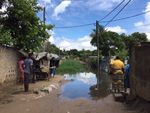Co-producing urban knowledge in Angola and Mozambique: towards meeting SDG 11 - Sylvia Croese Inês Raimundo Massamba Dominique - International ...
←
→
Page content transcription
If your browser does not render page correctly, please read the page content below
Co-producing urban knowledge in
Angola and Mozambique: towards
meeting SDG 11
Sylvia Croese
Inês Raimundo
Massamba Dominique
LIRA 2030 webinar series
26 November 2020Making Luanda and Maputo more “inclusive, safe, resilient and
sustainable” (SDG 11)
• establishment of a • the creation and
methodology for the strengthening of
implementation and mechanisms of local
monitoring of the SDGs knowledge (co-)
• a baseline for the formulation production and experience
of new or the implementation sharing amongst different
of existing urban policies actors and stakeholders
within as well as between
the cities of Luanda and
MaputoCo-producing urban knowledge in Angola and Mozambique: towards meeting SDG 11 • Research team: African Centre for Cities, University of Cape Town and Centre for Public Policy Analysis, Eduardo Mondlane University and NGO Development Workshop Angola à with input from/in collaboration with: local community members, university students, National Institutes of Statistics, National Ministries, UN agencies (UNDP and UN Habitat), civil society, academia, Urban Upgrading Office Luanda (GTRUCS), National Association of Mozambican Municipalities (ANAMM) • Methods: site visits, key informant interviews, focus groups, participatory mapping, survey work in three settlements in each city with focus on SDG targets 11.1; 11.2; 11.3; 11.6; 11.7 (housing and basic services; transport, participation, waste management and public spaces), validation workshops in each neighbourhood and city
Key results • Importance of measuring qualitative dimension of SDG 11 indicators (price, quality, safety, inclusivity, sustainability) • Importance of research methods that reflect the experience of vulnerable groups in society (women, elderly, disability, but also urban youth) • Importance of disaggregated data and analysis to reflect local variation, ie. the need for the localization of SDG indicators to reflect local realities and perceptions and therefore more appropriate and context-specific policies and interventions • Importance of holistic, inter-sectorial and multi-stakeholder approaches as SDG targets cannot be approached and met in isolation à Results and recommendations included in Mozambique VNR 2020
Key outputs • Summarized results in ENG and PT • All data and instruments available through Open Data Repository Datafirst: https://www.datafirst.uct.ac.za/dataportal/ index.php/catalog/CO-SCS • Article forthcoming in npj Urban Sustainability (incl behind the paper feature) • Co-written and edited report and books (2 forthcoming)
Key lessons learned • Importance of TD approach for more inclusive knowledge production, partnerships and collaboration • Importance of local champions, buy in and ownership • The incorporation of non-traditional data and methods into existing data systems requires time, awareness and capacity building and is therefore an on-going process
OBRIGADA/THANK YOU Foto: Ngoi Salucombo LIRA 2030: https://council.science/what-we- do/funding-programmes/leading-integrated- research-for-agenda-2030-in-africa
You can also read



























































